- Home
- L. M. Montgomery
Emily of New Moon Page 17
Emily of New Moon Read online
Page 17
Emily cringed every time Miss Brownell said "poetry," with that jeering emphasis and that hateful pause before it. Many of the children giggled, partly because they enjoyed seeing a "Murray of New Moon" grilled, partly because they realized that Miss Brownell expected them to giggle. Rhoda Stuart giggled louder than anyone else; but Jennie Strang, who had tormented Emily on her first day at school, refused to giggle and scowled blackly at Miss Brownell instead.
Miss Brownell held up the slate and read Emily's poem aloud, in a sing-song nasal voice, with absurd intonations and gestures that made it seem a very ridiculous thing. The lines Emily had thought the finest seemed the most ridiculous. The other pupils laughed more than ever and Emily felt that the bitterness of the moment could never go out of her heart. The little fancies that had been so beautiful when they came to her as she wrote were shattered and bruised now, like torn and mangled butterflies--"vistas in some fairy dream," chanted Miss Brownell, shutting her eyes and wagging her head from side to side. The giggles became shouts of laughter.
"Oh," thought Emily, clenching her hands, "I wish--I wish the bears that ate the naughty children in the Bible would come and eat you."
There were no nice, retributive bears in the school bush, however, and Miss Brownell read the whole "poem" through. She was enjoying herself hugely. To ridicule a pupil always gave her pleasure and when that pupil was Emily of New Moon, in whose heart and soul she had always sensed something fundamentally different from her own, the pleasure was exquisite.
When she reached the end she handed the slate back to the crimson-cheeked Emily.
"Take your--poetry, Emily," she said.
Emily snatched the slate. No slate "rag" was handy but Emily gave the palm of her hand a fierce lick and one side of the slate was wiped off. Another lick--and the rest of the poem went. It had been disgraced--degraded--it must be blotted out of existence. To the end of her life Emily never forgot the pain and humiliation of that experience.
Miss Brownell laughed again.
"What a pity to obliterate such--poetry, Emily," she said. "Suppose you do those sums now. They are not--poetry, but I am in this school to teach arithmetic and I am not here to teach the art of writing--poetry. Go to your own seat. Yes, Rhoda?"
For Rhoda Stuart was holding up her hand and snapping her fingers.
"Please, Miss Brownell," she said, with distinct triumph in her tones, "Emily Starr has a whole bunch of poetry in her desk. She was reading it to Ilse Burnley this morning while you thought they were learning history."
Perry Miller turned around and a delightful missile, compounded of chewed paper and known as a "spit pill," flew across the room and struck Rhoda squarely in the face. But Miss Brownell was already at Emily's desk, having reached it one jump before Emily herself.
"Don't touch them--you have no right!" gasped Emily frantically.
But Miss Brownell had the "bunch of poetry" in her hands. She turned and walked up to the platform. Emily followed. Those poems were very dear to her. She had composed them during the various stormy recesses when it had been impossible to play out of doors and written them down on disreputable scraps of paper borrowed from her mates. She had meant to take them home that very evening and copy them on letter-bills. And now this horrible woman was going to read them to the whole jeering, giggling school.
But Miss Brownell realized that the time was too short for that. She had to content herself with reading over the titles, with some appropriate comments.
Meanwhile Perry Miller was relieving his feelings by bombarding Rhoda Stuart with spit pills, so craftily timed that Rhoda had no idea from what quarter of the room they were coming and so could not "tell" on anyone. They greatly interfered with her enjoyment of Emily's scrape, however. As for Teddy Kent, who did not wage war with spit pills but preferred subtler methods of revenge, he was busy drawing something on a sheet of paper. Rhoda found the sheet on her desk the next morning; on it was depicted a small, scrawny monkey, hanging by its tail from a branch; and the face of the monkey was as the face of Rhoda Stuart. Whereat Rhoda Stuart waxed wroth, but for the sake of her own vanity tore the sketch to tatters and kept silence regarding it. She did not know that Teddy had made a similar sketch, with Miss Brownell figuring as a vampirish-looking bat, and thrust it into Emily's hand as they left school.
"'The Lost Dimond--a Romantic Tale,'" read Miss Brownell. "'Lines on a Birch Tree'--looks to me more like lines on a very dirty piece of paper, Emily--'Lines Written on a Sundial in our Garden'--ditto--'Lines to my Favorite Cat'--another romantic tail, I presume--'Ode to Ilse'--'Thy neck is of a wondrous pearly sheen'--hardly that, I should say. Ilse's neck is very sunburned--'A Deskripshun of Our Parlor,' 'The Violets Spell'--I hope the violet spells better than you do, Emily--'The Disappointed House'--
"'Lilies lifted up white cups
For the bees to dr--r--i--i--ink.'"
"I didn't write it that way!" cried tortured Emily.
"'Lines to a Piece of Brokade in Aunt Laura's Burow Drawer,' 'Farewell on Leaving Home,' 'Lines to a Spruce Tree'--'It keeps off heat and sun and glare, Tis a goodly tree I ween'--are you quite sure that you know what 'ween' means, Emily?--'Poem on Mr. Tom Bennet's Field'--'Poem on the Vew from Aunt Elizabeth's Window'--you are strong on 'v-e-w-s,' Emily--'Epitaff on a Drowned Kitten,' 'Meditashuns at the tomb of my great great grandmother'--poor lady--'To my Northern Birds'--'Lines composed on the bank of Blair Water gazing at the stars'--h'm--h'm--
"'Crusted with uncounted gems,
Those stars so distant, cold and true,'
Don't try to pass those lines off as your own, Emily. You couldn't have written them."
"I did--I did!" Emily was white with sense of outrage. "And I've written lots far better."
Miss Brownell suddenly crumpled the ragged little papers up in her hand.
"We have wasted enough time over this trash," she said. "Go to your seat, Emily."
She moved towards the stove. For a moment Emily did not realize her purpose. Then, as Miss Brownell opened the stove door, Emily understood and bounded forward. She caught at the papers and tore them from Miss Brownell' s hand before the latter could tighten her grasp.
"You shall not burn them--you shall not have them," gasped Emily. She crammed the poems into the pocket of her "baby apron" and faced Miss Brownell in a kind of calm rage. The Murray look was on her face--and although Miss Brownell was not so violently affected by it as Aunt Elizabeth had been, it nevertheless gave her an unpleasant sensation, as of having roused forces with which she dared not tamper further. This tormented child looked quite capable of flying at her, tooth and claw.
"Give me those papers, Emily,"--but she said it rather uncertainly.
"I will not," said Emily stormily. "They are mine. You have no right to them. I wrote them at recesses--I didn't break any rules. You"--Emily looked defiantly into Miss Brownell's cold eyes--"You are an unjust, tyrannical person."
Miss Brownell turned to her desk.
"I am coming up to New Moon tonight to tell your Aunt Elizabeth of this," she said.
Emily was at first too much excited over saving her precious poetry to pay much heed to this threat. But as her excitement ebbed cold dread flowed in. She knew she had an unpleasant time ahead of her. But at all events they should not get her poems--not one of them, no matter what they did to her. As soon as she got home from school she flew to the garret and secreted them on the shelf of the old sofa.
She wanted terribly to cry but she would not. Miss Brownell was coming and Miss Brownell should not see her with red eyes. But her heart burned within her. Some sacred temple of her being had been desecrated and shamed. And more was yet to come, she felt wretchedly sure. Aunt Elizabeth was certain to side with Miss Brownell. Emily shrank from the impending ordeal with all the dread of a sensitive, fine strung nature facing humiliation. She would not have been afraid of justice; but she knew at the bar of Aunt Elizabeth and Miss Brownell she would not have justice.
"And I can't write Fa
ther about it," she thought, her little breast heaving. The shame of it all was too deep and intimate to be written out, and so she could find no relief for her pain.
They did not have supper at New Moon in winter time until Cousin Jimmy had finished his chores and was ready to stay in for the night. So Emily was left undisturbed in the garret.
From the dormer window she looked down on a dreamland scene that would ordinarily have delighted her. There was a red sunset behind the white, distant hills, shining through the dark trees like a great fire; there was a delicate blue tracery of bare branch shadows all over the crusted garden; there was a pale, ethereal alpen-glow all over the southeastern sky; and presently there was a little, lovely new moon in the silvery arch over Lofty John's bush. But Emily found no pleasure in any of them.
Presently she saw Miss Brownell coming up the lane, under the white arms of the birches, with her mannish stride.
"If my father was alive," said Emily, looking down at her, "you would go away from this place with a flea in your ear."
The minutes passed, each seeming very long to Emily. At last Aunt Laura came up.
"Your Aunt Elizabeth wants you to come down to the kitchen, Emily."
Aunt Laura's voice was kind and sad. Emily fought down a sob. She hated to have Aunt Laura think she had been naughty, but she could not trust herself to explain. Aunt Laura would sympathize and sympathy would break her down. She went silently down the two long flights of stairs before Aunt Laura and out to the kitchen.
The supper table was set and the candles were lighted. The big black-raftered kitchen looked spookish and weird, as it always did by candlelight. Aunt Elizabeth sat rigidly by the table and her face was very hard. Miss Brownell sat in the rocking-chair, her pale eyes glittering with triumphant malice. There seemed something baleful and poisonous in her very glance. Also, her nose was very red--which did not add to her charm.
Cousin Jimmy, in his gray jumper, was perched on the edge of the wood-box, whistling at the ceiling, and looking more gnome-like than ever. Perry was nowhere to be seen. Emily was sorry for this. The presence of Perry, who was on her side, would have been a great moral support.
"I am sorry to say, Emily, that I have been hearing some very bad things about your behavior in school today," said Aunt Elizabeth.
"No, I don't think you are sorry," said Emily, gravely.
Now that the crisis had come she found herself able to confront it coolly--nay, more, to take a curious interest in it under all her secret fear and shame, as if some part of her had detached itself from the rest and was interestedly absorbing impressions and analyzing motives and describing settings. She felt that when she wrote about this scene later on she must not forget to describe the odd shadows the candle under Aunt Elizabeth's nose cast upward on her face, producing a rather skeletonic effect. As for Miss Brownell, could she ever have been a baby--a dimpled, fat, laughing baby? The thing was unbelievable.
"Don't speak impertinently to me," said Aunt Elizabeth.
"You see," said Miss Brownell, significantly.
"I don't mean to be impertinent, but you are not sorry," persisted Emily. ''You are angry because you think I have disgraced New Moon, but you are a little glad that you have got someone to agree with you that I'm bad."
"What a grateful child," said Miss Brownell--flashing her eyes up at the ceiling--where they encountered a surprising sight. Perry Miller's head--and no more of him--was stuck down out of the "black hole" and on Perry Miller's upside-down face was a most disrespectful and impish grimace. Face and head disappeared in a flash, leaving Miss Brownell staring foolishly at the ceiling.
"You have been behaving disgracefully in school," said Aunt Elizabeth, who had not seen this by-play. "I am ashamed of you."
"It was not as bad as that, Aunt Elizabeth," said Emily steadily. "You see it was this way--"
"I don't want to hear anything more about it," said Aunt Elizabeth.
"But you must," cried Emily. "It isn't fair to listen only to her side. I was a little bad--but not so bad as she says--"
"Not another word! I have heard the whole story," said Aunt Elizabeth grimly.
"You heard a pack of lies," said Perry, suddenly sticking his head down through the black hole again.
Everybody jumped--even Aunt Elizabeth, who at once became angrier than ever because she had jumped.
"Perry Miller, come down out of that loft instantly!" she commanded.
"Can't," said Perry laconically.
"At once, I say!"
"Can't," repeated Perry, winking audaciously at Miss Brownell.
"Perry Miller, come down! I will be obeyed. I am mistress here yet."
"Oh, all right," said Perry cheerfully. "If I must."
He swung himself down until his toes touched the ladder. Aunt Laura gave a little shriek. Everybody else seemed to be stricken dumb.
"I've just got my wet duds off," Perry was saying cheerfully, waving his legs about to get a foothold on the ladder while he hung to the sides of the black hole with his elbows. "Fell into the brook when I was watering the cows. Was going to put on dry ones--but just as you say--"
"Jimmy," implored poor Elizabeth Murray, surrendering at discretion. She could not cope with the situation.
"Perry, get back into that loft and get your clothes on this minute!" ordered Cousin Jimmy.
The bare legs shot up and disappeared. There was a chuckle as mirthful and malicious as an owl's beyond the black hole. Aunt Elizabeth gave a convulsive gasp of relief and turned to Emily. She was determined to regain ascendancy and Emily must be thoroughly humbled.
"Emily, kneel down here before Miss Brownell and ask her pardon for your conduct today," she said.
Into Emily's pale cheek came a scarlet protest. She could not do this--she would ask pardon of Miss Brownell but not on her knees. To kneel to this cruel woman who had hurt her so--she could not--would not do it. Her whole nature rose up in protest against such a humiliation.
"Kneel down," repeated Aunt Elizabeth.
Miss Brownell looked pleased and expectant. It would be very satisfying to see this child who had defied her kneeling before her as a penitent. Never again, Miss Brownell felt, would Emily be able to look levelly at her with those dauntless eyes that bespoke a soul untamable and free, no matter what punishment might be inflicted upon body or mind. The memory of this moment would always be with Emily--she could never forget that she had knelt in abasement. Emily felt this as clearly as Miss Brownell did and remained stubbornly on her feet.
"Aunt Elizabeth, please let me tell my side of the story," she pleaded.
"I have heard all I wish to hear of the matter. You will do as I say, Emily, or you will be outcast in this house until you do. No one will talk to you--play with you--eat with you--have anything to do with you until you have obeyed me."
Emily shuddered. That was a punishment she could not face. To be cut off from her world--she knew it would bring her to terms before long. She might as well yield at once--but, oh, the bitterness, the shame of it!
"A human being should not kneel to anyone but God," said Cousin Jimmy, unexpectedly, still staring at the ceiling.
A sudden strange change came over Elizabeth Murray's proud, angry face. She stood very still, looking at Cousin Jimmy--stood so long that Miss Brownell made a motion of petulant impatience.
"Emily," said Aunt Elizabeth in a different tone, "I was wrong--I shall not ask you to kneel. But you must apologize to your teacher--and I shall punish you later on."
Emily put her hands behind her and looked straight into Miss Brownell's eyes again.
"I am sorry for anything I did today that was wrong," she said, "and I ask your pardon for it."
Miss Brownell got on her feet. She felt herself cheated of a legitimate triumph. Whatever Emily's punishment would be she would not have the satisfaction of seeing it. She could have shaken "simple Jimmy Murray" with a right good will. But it would hardly do to show all she felt. Elizabeth Murray was not a trustee bu
t she was the heaviest ratepayer in New Moon and had great influence with the School Board.
"I shall excuse your conduct if you behave yourself in future, Emily," she said coldly. "I feel that I have only done my duty in putting the matter before your aunt. No, thank you, Miss Murray, I cannot stay to supper--I want to get home before it is too dark."
"God speed all travelers," said Perry cheerfully, climbing down his ladder--this time with his clothes on.
Aunt Elizabeth ignored him--she was not going to have a scene with a hired boy before Miss Brownell. The latter switched herself out and Aunt Elizabeth looked at Emily.
"You will eat your supper alone tonight, Emily, in the pantry--you will have bread and milk only. And you will not speak one word to anyone until tomorrow morning."
"But you won't forbid me to think?" said Emily anxiously.
Aunt Elizabeth made no reply but sat haughtily down at the supper table. Emily went into the pantry and ate her bread and milk, with the odor of the delicious sausages the others were eating for savor. Emily liked sausages, and New Moon sausages were the last word in sausages. Elizabeth Burnley had brought the recipe out from the Old Country and its secret was carefully guarded. And Emily was hungry. But she had escaped the unbearable, and things might be worse. It suddenly occurred to her that she would write an epic poem in imitation of The Lay Of The Last Minstrel. Cousin Jimmy had read The Lay to her last Saturday. She would begin the first canto right off. When Laura Murray came into the pantry, Emily, her bread and milk only half eaten, was leaning her elbows on the dresser, gazing into space, with faintly moving lips and the light that never was on land or sea in her young eyes. Even the aroma of sausages was forgotten--was she not drinking from a fount of Castaly?
"Emily," said Aunt Laura, shutting the door, and looking very lovingly upon Emily out of her kind blue eyes, "you can talk to me all you want to. I don't like Miss Brownell and I don't think you were altogether in the wrong--although of course you shouldn't be writing poetry when you have sums to do. And there are some ginger cookies in that box."
"I don't want to talk to anyone, dear Aunt Laura--I'm too happy," said Emily dreamily. "I'm composing an epic--it is to be called The White Lady, and I've got twenty lines of it made already--and two of them are thrilling. The heroine wants to go into a convent and her father warns her that if she does she will never be able to

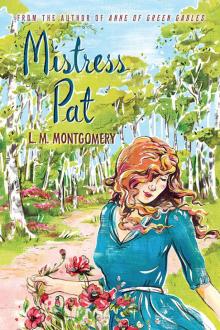 Mistress Pat
Mistress Pat A Tangled Web
A Tangled Web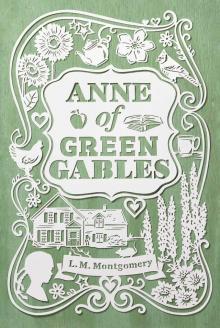 Anne of Green Gables
Anne of Green Gables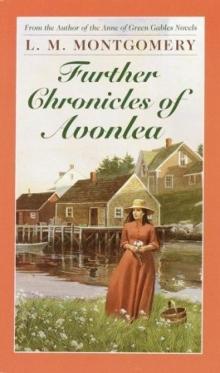 Further Chronicles of Avonlea
Further Chronicles of Avonlea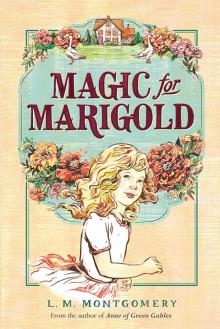 Magic for Marigold
Magic for Marigold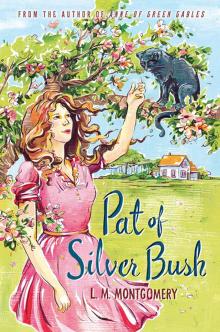 Pat of Silver Bush
Pat of Silver Bush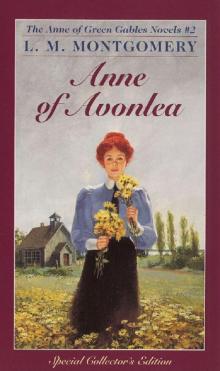 Anne of Avonlea
Anne of Avonlea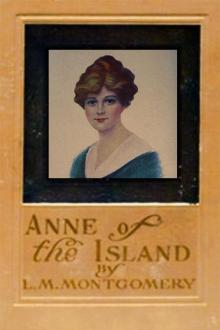 Anne of the Island
Anne of the Island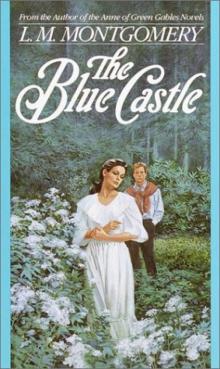 The Blue Castle
The Blue Castle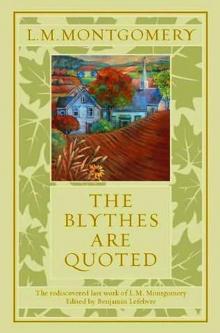 The Blythes Are Quoted
The Blythes Are Quoted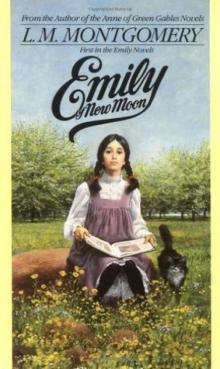 Emily of New Moon
Emily of New Moon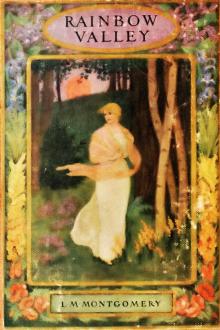 Rainbow Valley
Rainbow Valley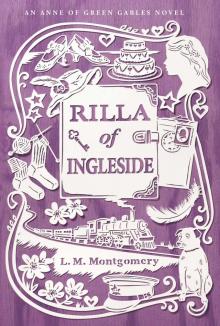 Rilla of Ingleside
Rilla of Ingleside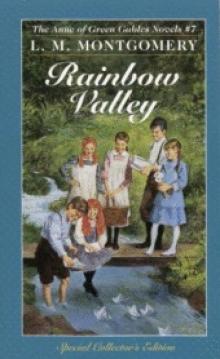 07 - Rainbow Valley
07 - Rainbow Valley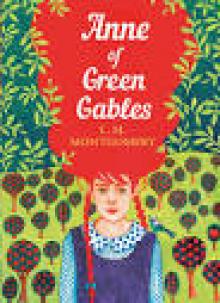 Anne of Green Gables (Penguin)
Anne of Green Gables (Penguin)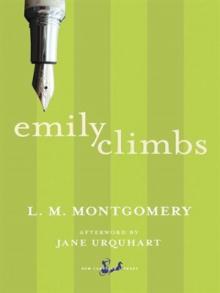 Emily Climbs
Emily Climbs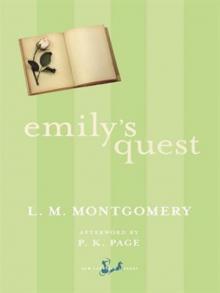 Emily's Quest
Emily's Quest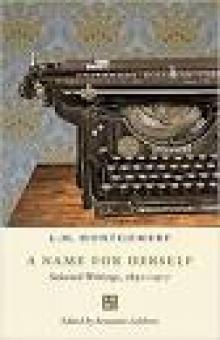 A Name for Herself
A Name for Herself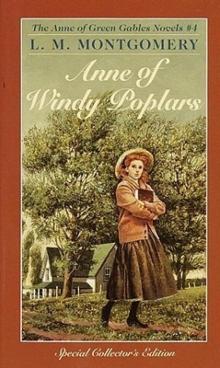 Anne of Windy Poplars
Anne of Windy Poplars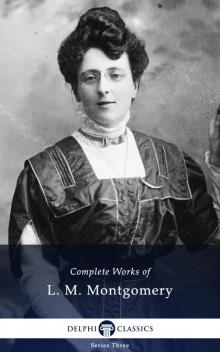 The Complete Works of L M Montgomery
The Complete Works of L M Montgomery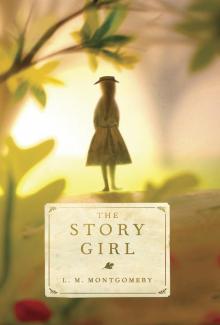 The Story Girl
The Story Girl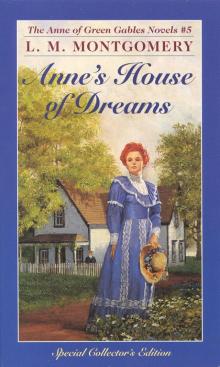 Anne's House of Dreams
Anne's House of Dreams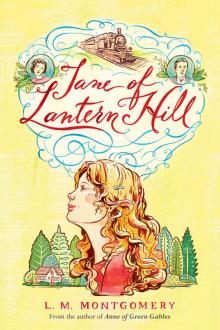 Jane of Lantern Hill
Jane of Lantern Hill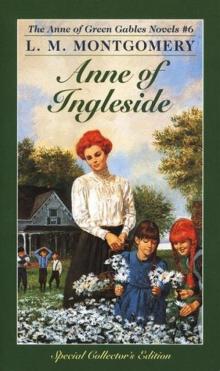 Anne of Ingleside
Anne of Ingleside